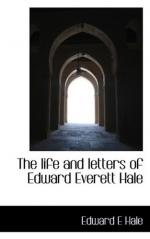|
This section contains 310 words (approx. 2 pages at 300 words per page) |
Dictionary of Literary Biography on Edward Everett Hale
Edward Everett Hale (3 April 1822-10 June 1909), Unitarian minister, essayist, and novelist, was representative of the changing society of the Boston Brahmins in the early nineteenth century. He possessed some of the typical advantages of the Brahmin group. His father, Nathan Hale, was a nephew of the famed Revolutionary War martyr, and editor and owner of the Boston Daily Advertiser. Young Hale's mother, Sarah Preston Everett, was a sister of prominent Unitarian clergyman and statesman Edward Everett, whose ministry at the Brattle Street Church had produced strong connections with such notables as Henry Clay. Edward Everett Hale also benefited from a typical Brahmin education. After preparatory work at the Boston Latin School, he entered Harvard College at the age of thirteen, and graduated second in the class of 1839, with membership in Phi Beta Kappa. Though he intended to pursue a career in the ministry, Hale spurned theological training, and occupied his time temporarily as an instructor at the Boston Latin School and writing essays for such journals as the Boston Miscellany of Literature and Fashion. Then in 1842 he preached a trial sermon before the Boston Association of Unitarian Ministers, was licensed to preach to that body, and in 1846 was appointed minister of the Church of the Unity in Worcester, Massachusetts. In 1856 he accepted a position as pastor of the South Congregational Church in Boston, when its minister, Frederic Huntington, left to serve as a professor at Harvard. Hale served as minister of the South Church until his resignation in 1899. The intermittent years produced literary activity typical of the liberal New England theologian and essayist. Although best known for his short story "The Man Without a Country," first published in the Atlantic Monthly in 1863. Hale penned three volumes of autobiography and wrote several fictional pieces. In 1903 he was appointed chaplain of the United States Senate, and died in Boston in 1909.
|
This section contains 310 words (approx. 2 pages at 300 words per page) |


